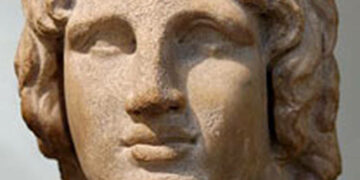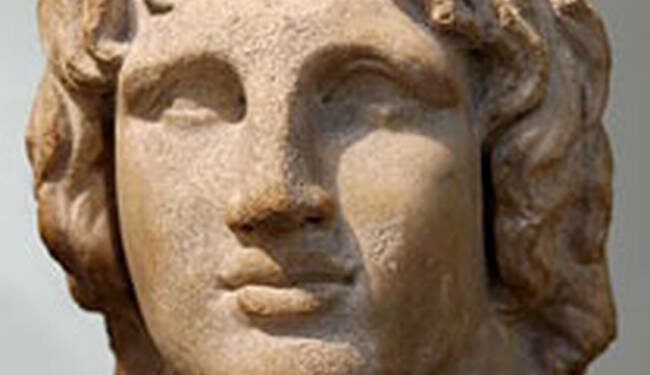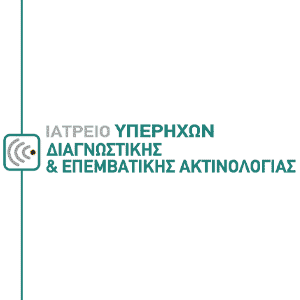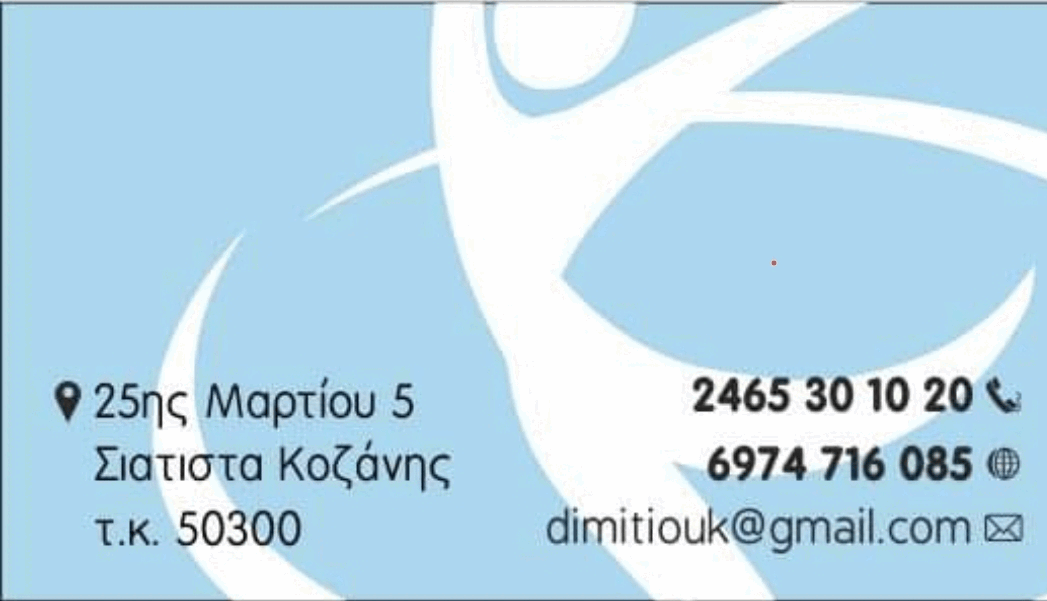Το ερχόμενο καλοκαίρι εκτιμάται ότι θα μπορεί να δέχεται επισκέπτες το ανάκτορο στο οποίο γεννήθηκε ο Μέγας Αλέξανδρος στην παραθαλάσσια τότε Πέλλα.
Στο κτίριο αυτό, τμήμα του οποίου είχε ανασκαφεί το 1957, όταν κανείς δεν γνώριζε ότι επρόκειτο για το ανάκτορο, μεγάλωσε ο βασιλιάς των Μακεδόνων ενώ στην παλαίστρα που βρίσκεται σε μικρή απόσταση από το κτίσμα, ο διάδοχος αθλούνταν με τους γόνους της αριστοκρατίας και στην τεράστια κολυμβητική δεξαμενή γύμναζαν το σώμα τους.
«Το ανάκτορο είχε δημόσιο χαρακτήρα και σε αυτό βρισκόταν η αίθουσα όπου γίνονταν τα συμπόσια, η αίθουσα του θρόνου, αν μου επιτρέπεται να χρησιμοποιήσω αυτή την έκφραση κατ αναλογία» εξηγεί στο ΑΠΕ – ΜΠΕ η προϊσταμένη της Εφορείας Αρχαιοτήτων Πέλλας, Ελισάβετ Τσιγαρίδα.
Η ίδια τονίζει ότι οι εργασίες στο χώρο βρίσκονται αυτή τη στιγμή σε πλήρη εξέλιξη, με χρηματοδότηση από το ΕΣΠΑ, και σημειώνει ότι το σημείο θα μπορεί να είναι επισκέψιμο το καλοκαίρι του 2021, αν όλα εξελιχθούν ομαλά.
Ο επισκέπτης θα βλέπει μπροστά του την κάτοψη του ανακτόρου, σε επίπεδο θεμελίωσης ενώ στόχος της Εφορείας Αρχαιοτήτων είναι η παρουσίαση μιας ψηφιακής ξενάγησης στο κέντρο υποδοχής επισκεπτών που αναμένεται να κατασκευαστεί με χρονικό ορίζοντα το 2023. Εκεί θα μπορεί κανείς να δει και την ψηφιακή αναπαράσταση όχι μόνο του ανακτόρου όπου γεννήθηκε ο Μακεδόνας βασιλιάς αλλά του κτιριακού συνόλου που αποτελούνταν από επτά τεράστια κτίρια, με εσωτερικές αυλές, διαδρόμους, κλιμακοστάσια και στοές που συνδέονταν μεταξύ τους.

Το κτιριακό σύνολο των ανακτόρων φτάνει τα εβδομήντα στρέμματα
«Η συνολική έκταση είναι γύρω στα 70 στρέμματα. Οι διαστάσεις αυτές μπορούν να γίνουν αντιληπτές αν ληφθεί υπόψη το γεγονός ότι η Πέλλα ήταν τότε η πρωτεύουσα του Μακεδονικού Βασιλείου. Το ανάκτορο ξεκίνησε πιο μικρό, αλλά επεκτάθηκε μετά την εκστρατεία του Μεγάλου Αλεξάνδρου. Η περίοδος από το 320 ως το 250 π.Χ. ήταν μια εποχή τεράστιας ακμής για τη Μακεδονία, ενώ ήταν γνωστός και ο πλούτος του ανακτόρου. Δεν ξεχνάμε ότι σε όλο τον τρίτο και τον δεύτερο π.Χ. αιώνα, η Πέλλα ήταν το κέντρο του Μακεδονικού Βασιλείου, ένα από τα σπουδαιότερα κράτη της εποχής» σχολιάζει η κ. Τσιγαρίδα.
Αυτοί, ήταν, άλλωστε και οι λόγοι για τους οποίους το ανάκτορο λεηλατήθηκε με μένος από τους Ρωμαίους που όταν ηττήθηκαν οι Μακεδόνες το 168 π.Χ. ήρθαν κατ ευθείαν στην Πέλλα. Όπως αναφέρει η προϊσταμένη της Εφορείας Αρχαιοτήτων, «οι Ρωμαίοι δεν κατέστρεψαν την πόλη αλλά λεηλάτησαν το ανάκτορο, όπου βέβαια υπήρχαν και οι θησαυροί. Πήραν ακόμη και τον βασιλιά και την οικογένειά του ως σκλάβους στη Ρώμη, επιδεικνύοντας τον θρίαμβό τους. Η τύχη της βασιλικής οικογένειας ήταν πολύ σκληρή ενώ το ανάκτορο δεν χρησιμοποιήθηκε πια. Ωστόσο η πόλη συνέχισε να υπάρχει και κατά τη διάρκεια των Ρωμαϊκών χρόνων, καθώς από εκεί περνούσε και Εγνατία Οδός, ένας δρόμος που ένωνε την Ανατολή με τη Δύση».
Στα ίχνη του λιμανιού της Πέλλας
Στο μεταξύ, οι αρχαιολόγοι της Εφορείας Αρχαιοτήτων βρίσκονται στα ίχνη της ακτογραμμής του λιμανιού της Πέλλας, όπου οι Μακεδόνες αποφάσισαν να μεταφέρουν την νέα πρωτεύουσά τους, φεύγοντας από τις Αιγές. Και μπορεί σήμερα να μην υπάρχει θάλασσα στην Πέλλα, όμως οι πηγές αναφέρουν τον παραθαλάσσιο χαρακτήρα της. Τα επόμενα χρόνια το τοπίο άλλαξε στην περιοχή και λόγω των προσχώσεων από τα ποτάμια που μετέφεραν φερτά υλικά, ο προστατευμένος κόλπος της Πέλλας μετατράπηκε σε λιμνοθάλασσα που αργότερα έγινε η λίμνη των Γιαννιτσών και τελικά αποξηράνθηκε.

«Εργαστήκαμε δύο χρόνια και συγχρόνως κάνουμε σαν εφορεία επιφανειακή έρευνα. Οι αρχαιολόγοι περπατάμε όλη την έκταση για να δούμε πού έχουμε συγκέντρωση ευρημάτων, νησίδες και άλλες ενδείξεις που μας δίνουν στοιχεία. Είναι μια έρευνα που δεν στοιχίζει, ωστόσο μας εφοδιάζει με πολύτιμες λεπτομέρειες. Παράλληλα συνεργαζόμαστε με ειδικούς επιστήμονες οι οποίοι με τον απαραίτητο εξοπλισμό προχωρούν στη γεωφυσική διασκόπηση» σχολιάζει η κ. Τσιγαρίδα. Με τη μέθοδο αυτή, όπως επισημαίνει, που έχει περιορισμένο κόστος σε σχέση με την ανασκαφή, τα μηχανήματα σκανάρουν το έδαφος και μπορούν να ανιχνεύσουν την ύπαρξη θαμμένων αρχαιοτήτων και το σημείο στο οποίο βρίσκονται, χωρίς να είναι απαραίτητες οι απαλλοτριώσεις μεγάλων εκτάσεων.
Ήδη, οι αρχαιολόγοι έχουν εντοπίσει την ακτογραμμή του λιμανιού της Πέλλας και το νησάκι Φάκος που βρισκόταν απέναντί της και διέθετε τείχος. Πλέον προσπαθούν να αντιληφθούν τι γινόταν τα πρώτα χρόνια ίδρυσης της πόλης στις αρχές του 5ου αιώνα και τα χρόνια στα οποία λειτουργούσε ως λιμάνι. Για τη συγκεκριμένη λειτουργία, η προϊσταμένη της Εφορείας Αρχαιοτήτων σημειώνει ότι μπορεί η εκστρατεία του Μεγάλου Αλεξάνδρου να ξεκίνησε από το λιμάνι της Αμφίπολης, όμως στο λιμάνι της Πέλλας κατασκευάστηκαν πάρα πολλά από τα πλοία του Μακεδονικού στόλου. Εκεί γίνονταν επίσης δεκτές οι περισσότερες πρεσβείες ξένων που ερχόταν από άλλες περιοχές ενώ σημαντικός ήταν και ο ρόλος του λιμανιού στην εμπορική ζωή της πόλης και την ανάπτυξη της κεραμοποιίας για την οποία η Πέλλα έγινε πολύ διάσημη.
Περισσότερα στοιχεία για την έκταση της παραθαλάσσιας Πέλλας, τον πολεοδομικό της ιστό, το τείχος και τα μνημεία της αναμένεται να προκύψουν από το ερευνητικό πρόγραμμα που αναμένεται να ξεκινήσει στις αρχές του 2021.





























